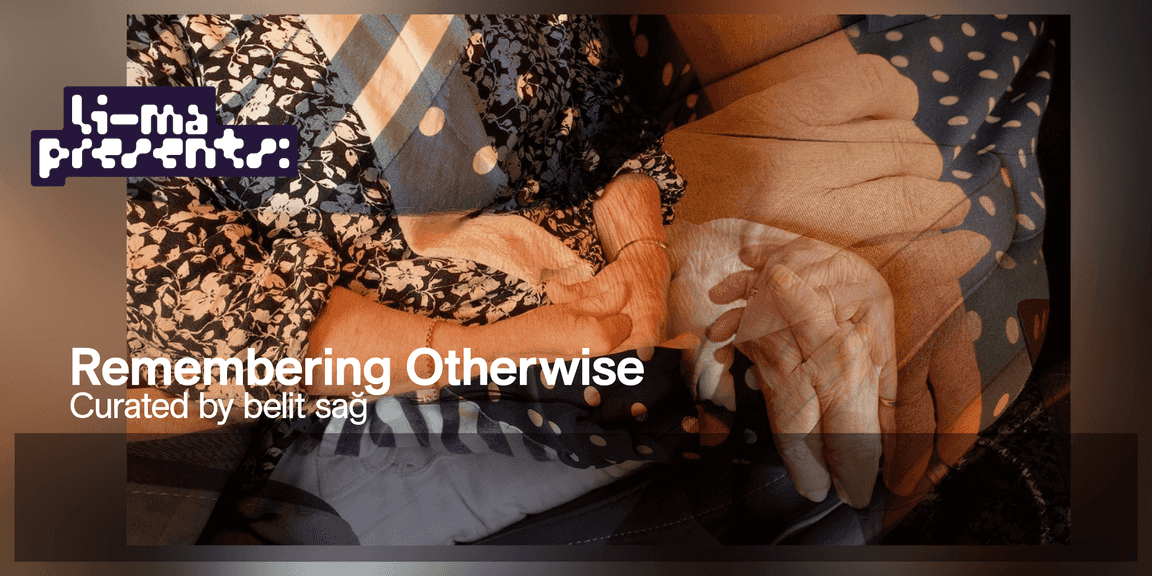
LI-MA Presents: Remembering Otherwise
New edition of LI-MA Presents, curated by guest curator belit sağ. Join us for an evening of screenings and talks at LAB111.
For this edition of LI-MA Presents, videomaker and visual artist belit sağ showed a selection of works from the LI-MA collection in dialogue with other works. The evening was moderated by Sanneke Huisman.
Throughout the year, LI-MA presents programmes of media and video art from its own collection and with guest curators – all at LAB111, where LI-MA is located. The programmes compiled by a guest curator usually focus on a specific theme. For the upcoming edition, artist belit sağ delves into LI-MA's collection and puts together their personal programme. As a filmmaker and artist, sağ reflects on how (media) images affect us personally and socially, as well as on how archives organize and represent histories. sağ will bring together a screening programme, Remembering Otherwise, where filmmakers and artists work with the excess and the unarchivable memories. In the selected films, smell, touch, gossip, sonic resonances, tactility, and nonlinear timelines are foregrounded as relevant ways to connect with the historical. As part of the selection programme, she will show their work-in-progress short film with the same name as the programme, Remembering Otherwise.
Programme Details
Chikako Yamashiro, あなたの声は私の喉を通った (Your Voice Came Out Through My Throat), 2011
As the title indicates, in this work Chikako lends her body to the voices of survivors of the Battle of Okinawa during World War II. Using her body as an intergenerational conduit, the artist channels memories that create a link between the witnesses of that time and their inheritors; yet, the work reveals the break between the generations—the horrors of the past becoming incommensurable with a contemporary audience.
Chikako Yamashiro (born in Okinawa, Japan, in 1976) is an artist and filmmaker renowned for her exploration of the sociopolitical histories of her homeland. In her atmospheric video works, Yamashiro provides a platform for the oral and historical accounts of local and marginalized voices, revealing the narratives that shape Okinawa’s contemporary identity.
Danielle Dean, Bazar, 2018, 10:34 min
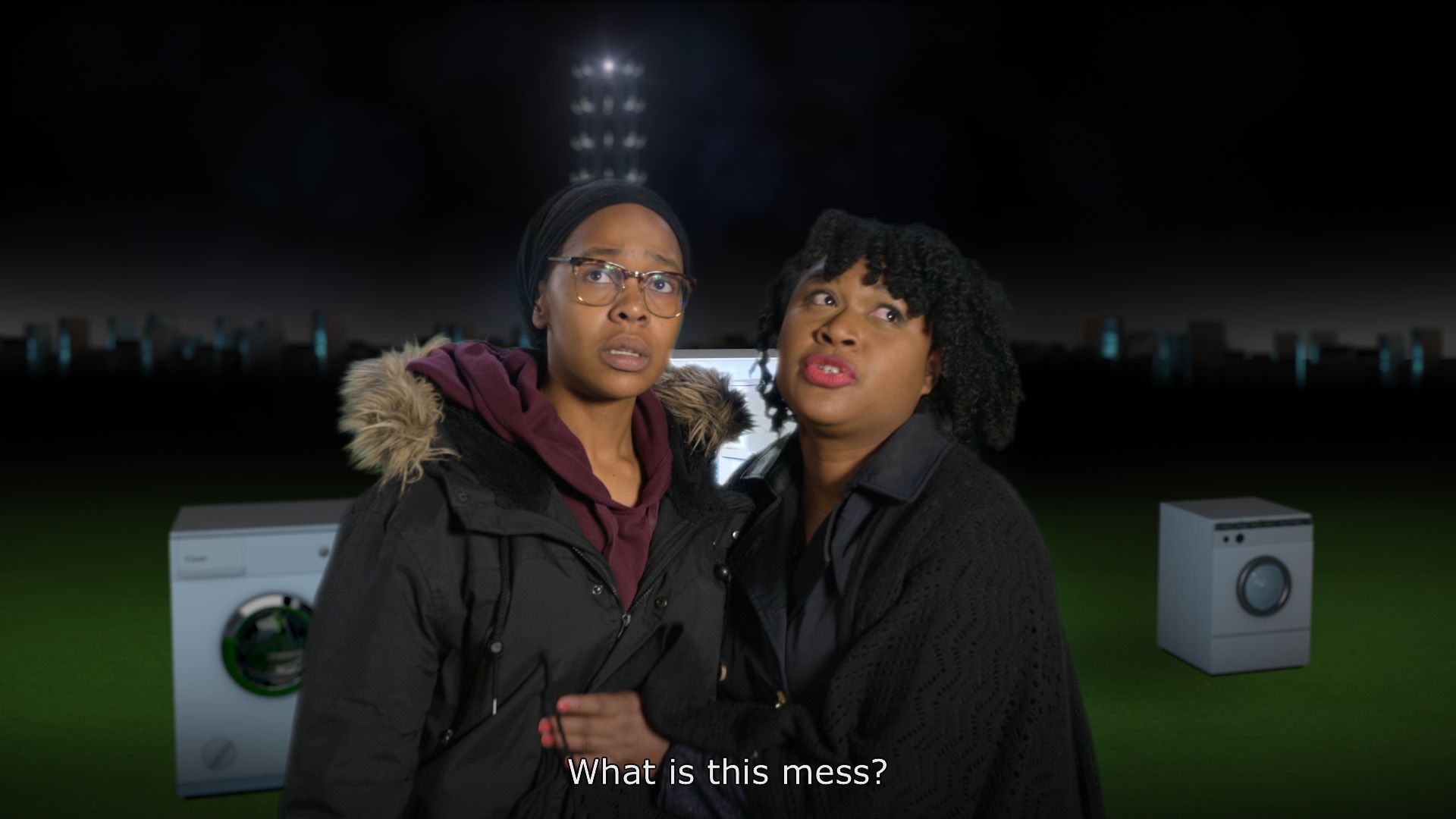
Danielle Dean, Bazar, 2018, video, color, sound (videostill)
In Bazar, Dean and her collaborators from the association Permis de Vivre la Ville (Licence to Live in the City) critically surveyed the catalogue of the French department store Bazar de l’Hôtel de Ville, produced from the late nineteenth century to the present day. Together, they reveal how racist stereotypes, colonial power, and consumerist culture have been perpetuated both in the past and the present.
Danielle A. Dean (born in Alabama, US, in 1982) is a multimedia artist engaged in archives, video, performance, social practices, sculpture, and drawing. Her diverse practice investigates the recursive dynamics of global capitalism, looping and circulating ideas and products. Dean’s works are held in several public collections worldwide, including the Stedelijk Museum Amsterdam.
Judith Westerveld, A Few Common Phrases, 2018, 05:40 min
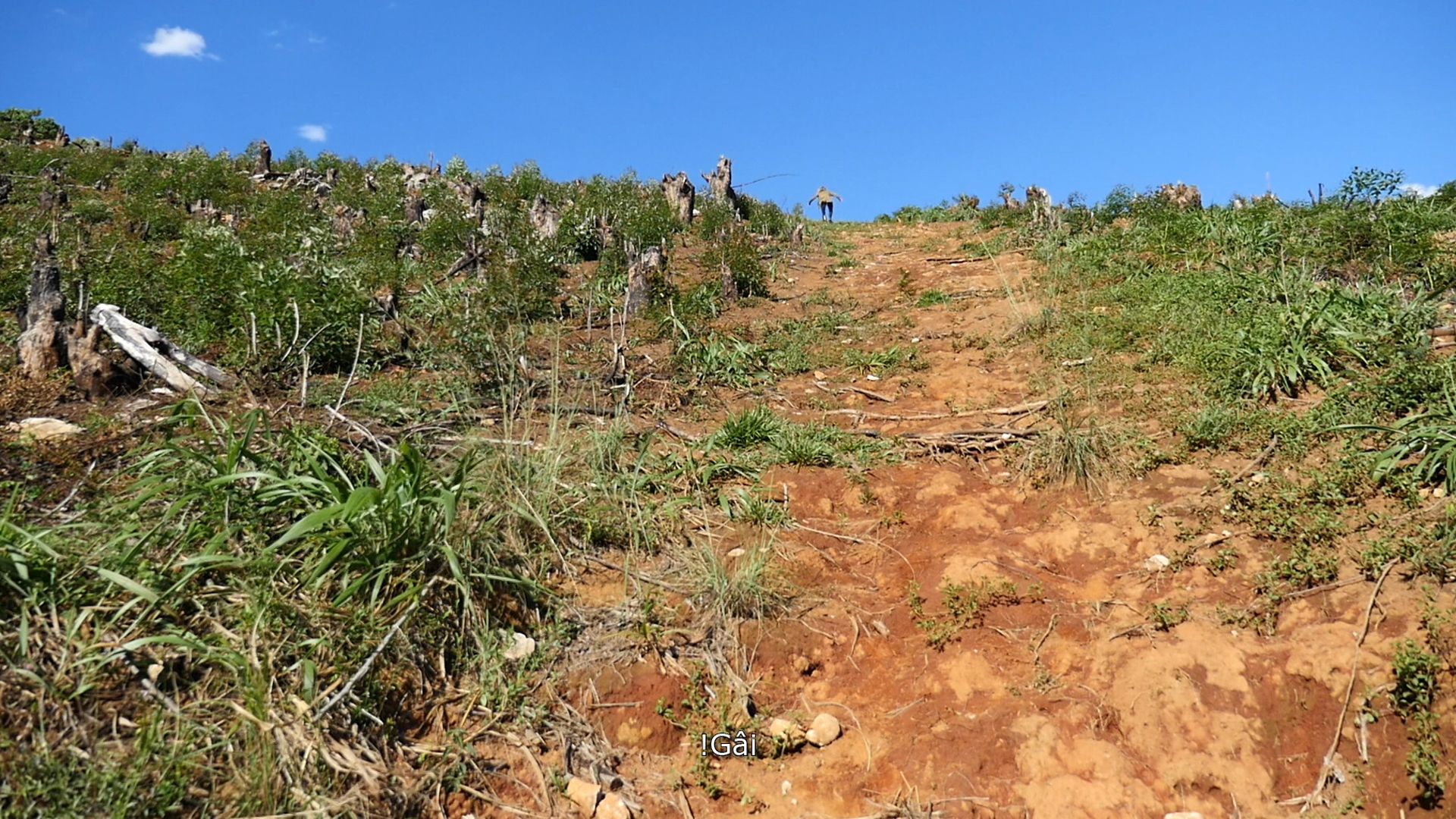
Judith Westerveld, A Few Common Phrases, 2018 (videostill)
Recording a performative action of Judith Westerveld on the grounds of the home where she grew up in Magoebaskloof, South Africa. The video captures a first practice session of the Khoikhoi language Khoekhoegowab. Spurred on by the formative research question ‘What if the Dutch colonists had learned to speak San and Khoe languages instead of imposing their own language upon those they encountered?’, Westerveld set out to learn this language that was once spoken throughout Southern Africa by the Khoikhoi people.
Judith Westerveld (born in The Hague, the Netherlands, in 1985) is a research-based artist operating from Amsterdam. Drawing on her upbringing between the Netherlands and South Africa, Westerveld explores the socio-political impact of the colonial past on the present. Her multidisciplinary practice includes films, audio-visual installations, photocollages, drawings, and performances.
Noor Abed, A Night We Held Between, 2024, 30 min
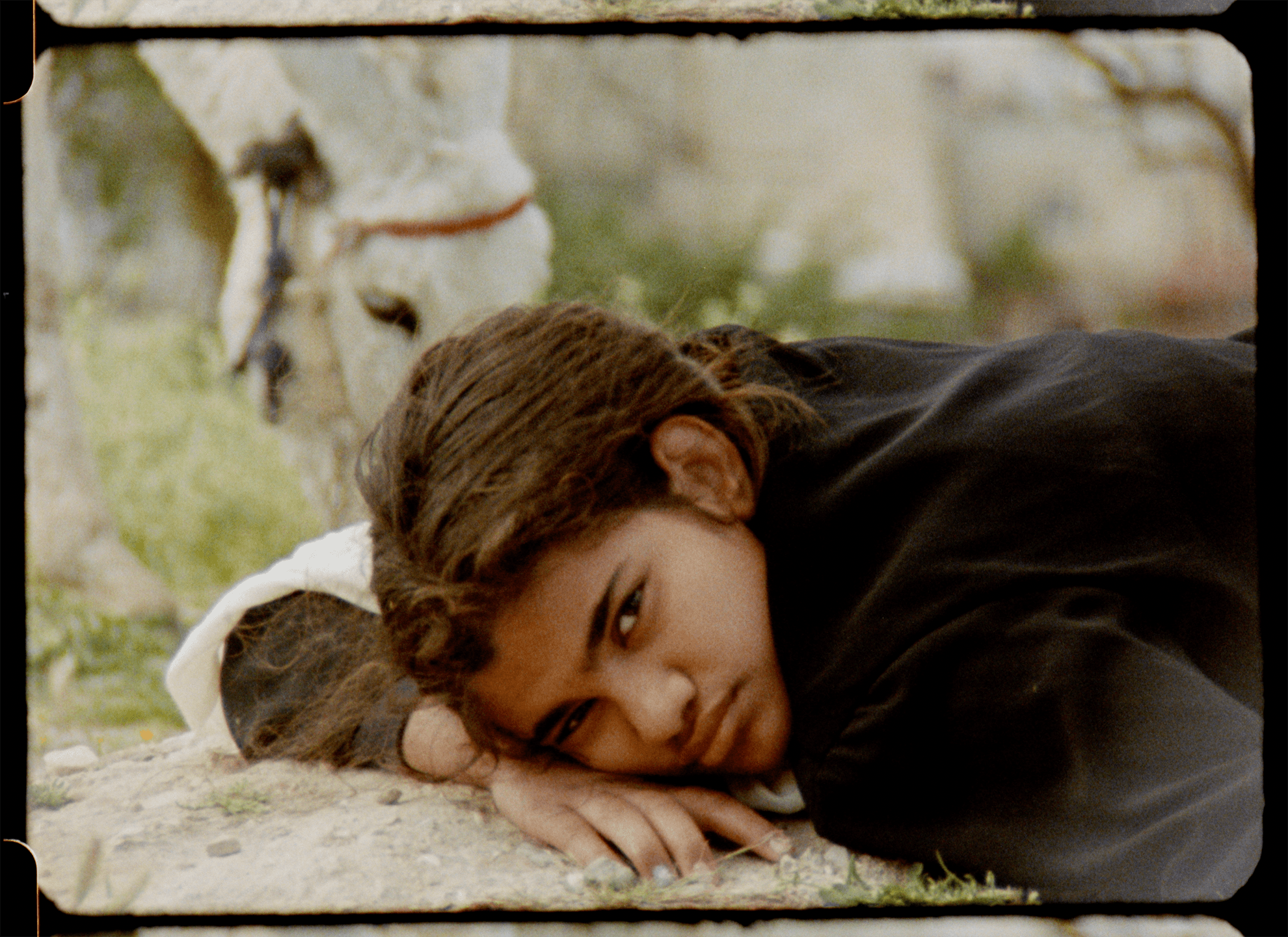
Noor Abed, A Night We Held Between, 2024, digital transfer of 16mm film, w/ sound (videostill)
The film centers around Song for The Fighters, which was found at the sonic archive of the Popular Art Center Palestine. Through the layers of the song, in a labyrinth of sounds and sites, the film conjures history as a permanent present tense, a collective and imaginative act.
Noor Abed (born in Palestine in 1988) is a performance artist and filmmaker who has been in residence at the Rijksakademie in Amsterdam since 2022. In 2020, she co-founded the School of Intrusions, an independent educational collective in Ramallah, Palestine. Abed’s practice explores social choreographies and collective formations, blending the staged with the documented.
belit sağ, Remembering Otherwise (WIP), 2024, video performance 15 min
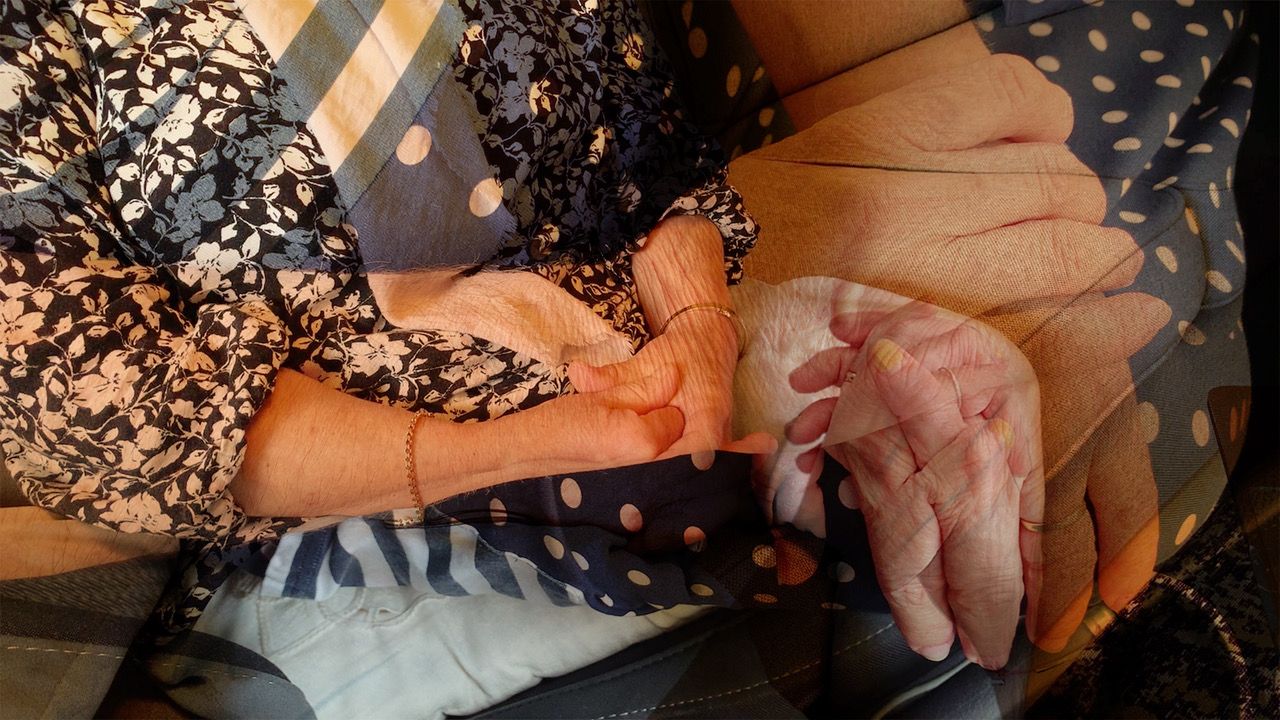 belit sağ, Remembering Otherwise (WIP), 2024, video performance 15 min
belit sağ, Remembering Otherwise (WIP), 2024, video performance 15 min
Check out works by belit sağ that are part of the LI-MA collection here:
what remains, 2018
cut-out, 2018
Kirk kere söylersen... / If you say it forty times..., 2017
disruption (aksama), 2016
grain, 2016
Ayhan and Me, 2016
my camera seems to recognize people, 2015
Sept. Oct. 2015, Cizre, 2015
and the image gazes back, 2014
About the artist
belit sağ (1980, Nazilli-Turkey, she/they) studied mathematics in Ankara and audiovisual arts in Amsterdam. Her moving image practice is rooted in video-activist groups she co-founded in Turkey. They were an artist in residence at Rijksakademie van Beeldende Kunsten (2014/2015, Amsterdam) and International Studio and Curatorial Program (2016 and 2019, New York City). Her research-based artistic practice focuses on archival visual representations of political violence and female, queer, and migrant solidarities.
Thumbnail image: belit sağ, what remains, 2018 | Header image: belit sağ, Remembering Otherwise







